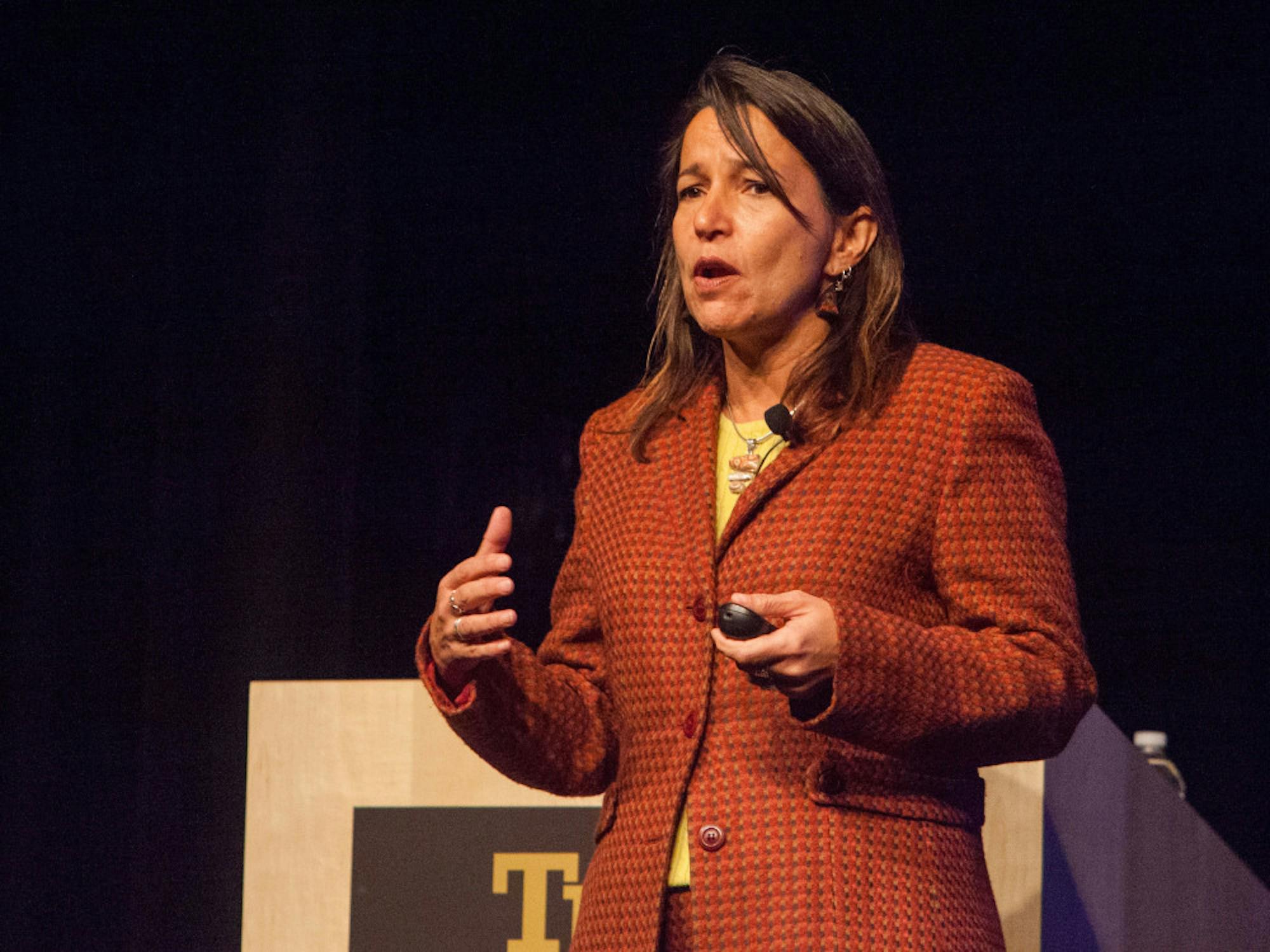Tufts community members gathered yesterday evening for a public lecture and interdisciplinary discussion of the Ebola virus and its recent outbreak in West Africa. The event, titled “Ebola Outbreak: Causes and Consequences at a Global Scale,” was part of the Tufts’ One Health Series on Ebola and took place in Cohen Auditorium.
“[The Ebola crisis] is clearly something that requires the attention of people who work in the sciences, but it also requires the attention of people who work in the social sciences,” Provost and Senior Vice President David Harris said in his opening remarks.
Joia Mukherjee, chief medical officer of Partners in Health, began the event with a keynote lecture on the medical and health implications of the outbreak.
“This is not just about health. This is about society. This is about human dignity. This is about human rights," Mukherjee said. "We are wrong if we look at it just from a medical lens,”
She started the discussion by listing African cities that have been heavily affected by Ebola to reiterate the interconnected nature of global health.
“These are small, forgotten places around the planet, yet I find it very important to remember these names because it reminds us that health anywhere effects health everywhere,” Mukherjee said. “If we don’t feel that we are connected to these places then we will make gross systematic errors and that is what Ebola represents to us at Partners in Health.”
Mukherjee gave a brief overview of the history of Ebola, beginning with the first recorded Ebola outbreak in 1976. This deathly outbreak was largely dismissed as a “controlled” epidemic because it didn’t spread far geographically, even though it had only 38 survivors.
“I don’t know how anyone can look at an epidemic with only 38 survivors and call it controlled. Just because it doesn’t reach us doesn’t mean it’s controlled,” Mukherjee said. “This epidemic is very, very different.”
As of Oct. 14 there have been 4,555 recorded deaths from Ebola, but the Center for Disease Control and Prevention (CDC) estimates the actual death toll is actually about three times that when accounting for unrecorded deaths, according to Mukherjee. She underscored the notable proportion of health care workers that have died from the disease to show how the lack of protection of health workers is advancing the outbreak.
“Five percent of deaths have been among health workers, many of whom were local nationals who did not have proper protective gear,” Mukherjee said. “A lot of clinics are closing because of Ebola … not just because health workers are dying, but they’re also afraid.”
Mukherjee also highlighted the gendered spread of the disease.
“Seventy-five percent of Ebola victims have been women,” she said. “Why do you think that is? They’re the caretakers. They’re the ones who care for the sick.”
Mukherjee criticized the approach international aid organizations have taken toward educating West African citizens on the Ebola epidemic. She referenced specifically one United Nations Children's Fund poster that advised ‘don’t touch Ebola patients,’ ‘don’t play with gorillas’ and ‘don’t eat bush meat,’ advice she believed to be unrealistic, insensitive and racially-rooted.
“If you are a wife, if you are a mother, if you are a sister, you are going to care for your sick family member,” Mukherjee said.
She encouraged organizations and governments to instead shift their attention toward providing resources such as protective gear for people caring for family members at home, hiring community health workers and approaching the epidemic with a face of compassion and solidarity rather than forcible isolation.
“We have to set up a set up a system in which people don’t have [to care for them at home]," Mukherjee said. "We can't just tell people to avoid people with Ebola."
Mukherjee also said that the media’s coverage of the Ebola crisis is both misinformed and exoticized. Media stories have disproportionately focused on the role of African funeral ritual in the spread of Ebola, yet preparation of the body for afterlife is not unique to African cultures. Virtually every culture prepares the body for the afterlife, she explained.
"Exoticizing Africans and funerals and poor people is the wrong message," Mukherjee said. "Really the causes of this epidemic are much simpler. It's about structural challenges and basic human rights."
Mukherjee reiterated throughout the lecture that the need for improved health infrastructure and the need for attention to human rights in West Africa extends beyond the current Ebola crisis but is a deeply rooted structural issue.
The lecture was followed by a panel discussion on the environmental, economic, animal health and data collection aspects of the virus with Associate Professor of Economics Margaret McMillan, Professor of Civil and Environmental Engineering Elena Naumova, Associate Professor of Anthropology Rosalind Shaw and Research Assistant Professor of Conservation Medicine at the Cummings School of Veterinary Medicine Christopher Whittier. The event ended with a question and answer session open to the audience.
Mukherjee calls for compassion in fight against Ebola

– Partners in Health Director, Dr. Joia Mukherjee, speaks on the need for a human rights perspective in the Ebola outbreak.





